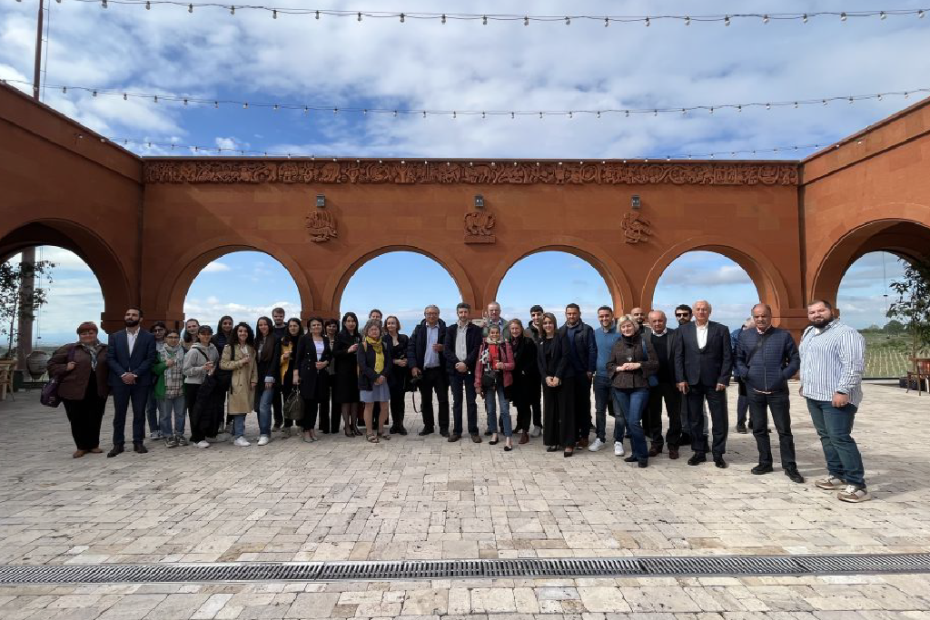On May 3-4, a remarkable collaboration took place, bringing together renowned institutions and experts in viticulture from Armenia, Sweden, France, and Germany. The Armenian Bioinformatics Institute, the Institute of Molecular Biology NAS RA, the Bordeaux Institute of Grape and Wine Sciences, the Swedish University of Agricultural Sciences, Telavi State University, and the Wine History Museum of Armenia jointly hosted the international workshop titled “Viticulture2:0. From Science to Vineyard.” This event, supported by the ANSO (Armenia-China-France) and ProGriCC (Armenia-Sweden-Georgia) projects, proved to be a significant milestone in advancing the understanding and development of viticulture practices.
Day 1: Sharing Insights and Discoveries
The first day of the conference was dedicated to presentations, where esteemed colleagues from Sweden, France, Georgia, Germany, and local representatives from Armenia shared their extensive research and ongoing projects. It was an enlightening experience, with a diverse range of topics discussed. But before the conference began, participants had the privilege of immersing themselves in the rich history of Armenian viticulture and wine through captivating exhibitions. Topics and authors of presentations can be seen at the end of this article.
Day 2: Journey to the Heart of Viticulture
The second day of the workshop took participants on an unforgettable trip to Vayots Dzor, Areni, a region deeply intertwined with the roots of viticulture. The renowned archeologist Boris Gasparyan, who played a pivotal role in the excavation of the Areni-1 cave, led a captivating lecture-tour within the multi-component site. The cave’s historical significance added a layer of depth to the exploration.
Next Stop: The High-Altitude Marvel
The journey continued as our team ventured to the breathtaking high-altitude experimental vineyard operated by the “Maran” winery in collaboration with the Institute of Molecular Biology NAS RA. Overcoming the challenging terrain, accessible only by special off-road vehicles, we reached an astonishing altitude of 2090 meters, where the vineyard thrived.
Frunz Harutyunyan, representing the “Maran” winery, graciously guided us through the vineyard, providing valuable insights into the diverse grape varieties cultivated in this unique environment. Amidst conversations and discussions, we enjoyed the company of one another, savoring the refreshing mountain air and embracing the panoramic views.
The international workshop “Viticulture2:0. From Science to Vineyard” served as a remarkable platform for knowledge exchange and collaboration among experts in viticulture. This event not only showcased the achievements of ongoing projects but also reinforced the shared commitment to the future of sustainable and innovative viticulture practices. With a newfound wealth of knowledge and inspiration, the participants departed, eagerly awaiting the next chapter in this exciting journey.
Authors and titles of presentations:
- “Grapevine genetic resources of Armenia: ancient biodiversity for future Viticulture” – Kristine Margaryan, Group leader IMB NAS RA, Armenia
- “Grape genetics in Bordeaux: from roots to fruit quality”- Nathalie Ollat, Director of EGFV, France
- “The Viking Vineyards: How Sweden is Revolutionizing Wine Production and Could AI and Bioinformatics Improve Growth” – Erik Bongcam-Rudloff, Professor of Bioinformatics and the head of SLU-Global Bioinformatics Centre at the Swedish University of Agricultural Sciences
- “Diversity of varieties: a major tool to adapt to climate change” – Agnès Destrac, INRAE, France
- “Georgian Traditional Technologies and Future Tendencies in Wine Making” – Medea Ormotsadze, Telavi State University, Georgia
- “Water Changed into Wine: shaping the Roots of Viticulture and Wine-Making” – Boris Gasparyan, Institute of Archaeology and Ethnography NAS RA
- “VINE Bioinformatics for innovative viticulture in Armenia” – Hans Binder, ABI, Armenia and University of Leipzig, Germany
- “Rootstocks: a sustainable solution for soil-borne pests and abiotic factors”- Nathalie Ollat, Director of EGFV, France
- “Armenia, the sacred land of wine” – Aramais Mkrtchyan, VWFA, Armenia
Overview by Araz Chiloyan
